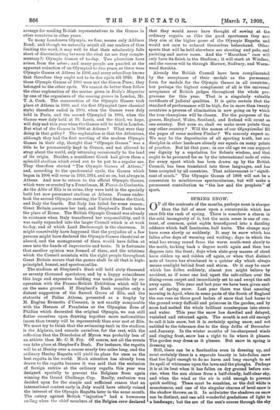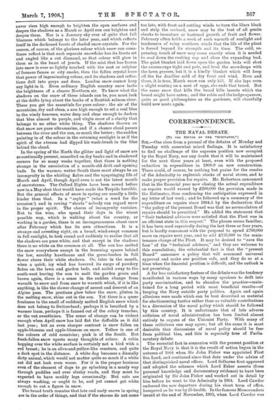SPRING SNOW.
OF all the contrasts of the months, perhaps none is sharper than the fall of snow upon a countryside which has once felt the rush of spring. There is somehow a charm in the cold incongruity of it, but the main sense is one of con- trast, of common, quiet sights transfigured into a dazzling oddness which half fascinates, half hurts. The change may have come slowly or suddenly. It may be snow which has fallen after days of warning and waiting; days in which the wind has swung round from the warm south-west slowly to the north, tacking back a degree south again and then two degrees into the frost; days when slate-grey masses of cloud have ridden up and ridden off again, or when that distinct note of brown has slumbered in a quieter sky which always means sunlight behind frost and storm. Or it may be snow which has fallen suddenly, almost you might believe by accident, as if some one had upset the salt-cellars over the dining-room carpet and immediately set to and swept the salt away again. This year and last year we have been given each sort of spring snow. Last year there was that amazing morning in April, when in some parts of the South of England the sun rose on three good inches of snow that had borne to the ground every daffodil and primrose in the garden, and by noon had melted the whole brilliant counterpane into steam and water. This year the snow has dawdled and delayed, vanished and returned again. The month is not old enough to call it late snow, but it is certainly spring snow, and not entitled to the tolerance due to the deep drifts of December and January. In the winter months of ice-sharpened winds and ringing frost, snow has a right to lie where it pleases. The garden may dress as it pleases. But snow in spring is dressing up.
Still, there can be a fascination even in dressing up, and most certainly there is a separate beauty in late-fallen snow that lies light enough to do no harm and long enough to set its spell of whiteness upon the lawn and the ploughs. Perhaps it is at its beat when it has fallen on dry ground before sun- rise, when the sun shines from a half-cloudy, half-clear sky, and when the wind or the air is cold enough to prevent quick melting. There must be sunshine, or the dull white is monotonous, and one of the singular charms of level snow is the shadow thrown on it. In midwinter the shadows on snow can be distinct, and can add wonderful gradations of light to a landscape; but the aro of the sun's course through the sky never rises high enough to brighten the open surfaces and deepen the shadows as a March or April sun can brighten and deepen them. Nor is a January sky ever of quite that full blueness which belongs to the later year, and which reflects itself in the darkened facets of shaded snow-crystals. For the reason, of course, of the glorious colour which snow can some- times reflect is that each separate snowflake has its facets set and angled like a cut diamond, so that colour will glow in them as in the heart of jewels. If the mist that has frozen into snow is ever so lightly touched with the soot or sulphur of furnace fumes or city smoke, then the fallen crystal loses that power of ingeminating colour, and its shadows and reflec- tions dull into greys and duns. London snow cannot keep any light in it. Even ordinary English country snow lacks the brightness of a clearer Northern air. To know what the shadows on the snow of these islands can be, you must look at the drifts lying about the banks of a Scottish salmon-river. There you get the essentials for pure colour : the air of the mountains, dry and clean, a sun high enough to set a real blue in the windy heavens, water deep and clear enough to darken that blue almost to purple, and virgin snow of a clarity that belongs to no other white thing. The shadows thrown on that snow are pure ultramarine, and if a chance cloud passes between the river and the sun, so much the better; the sudden 'painting in of the colour in the returning sunlight is as if the spirit of the stream had dipped his wash-brush in the blue behind the cloud.
In the spring of the North the glitter and light of snow are so continually present, unmelted on dry banks and in shadowed corners for so many weeks together, that there is nothing strange in the association of a month-old drift and opening buds. In the warmer, wetter South there must always be an incongruity in the whirling flakes and the upspringing life of March and April, though April even is not the latest month of snowstorms. The Oxford Eights have been rowed before now in a May sleet that would have made the Torpids horrible. But the general effects of snow in spring are usually a little kinder than that. In a " zephyr " (what a word for the occasion !) and in rowing " shorts " nobody can regard snow in the proper spirit. The charm of incongruity vanishes. But to the wise, who spend their days in the wisest • possible way, which is walking about the country, or working in a garden, there is an incongruousness about snow after February which has its own attractions. It is a strange and arresting sight, on a broad, wind-swept common in full sunlight, to look round and suddenly to realise that all the shadows are pure white, and that except in the shadows there is no white on the common at all. The sun has melted the snow everywhere except in the lessening spaces behind the low, scrubby hawthorns and the gorse-bushes in full flower above their white shadows. Or, later in the month, when a quick, icy wind has lowered its cargo of powdery flakes on the lawn and garden beds, and sailed away to the south-west leaving the sun to melt the garden green and brown again, there is a sense in the sudden change from warmth to snow and from snow to warmth which, if it is like anything, is like the slower change of ascent and descent of an Alpine pass. The gentians glow below the snow, glisten in the melting snow, shine out in the sun. Yet there is a queer freshness in the smell of suddenly melted English snow which does not belong to Switzerland; perhaps it is breathed by a warmer loam, perhaps it is fanned out of the celery trenches, or the wet sweetbriers. The sense of change can be violent enough when April snow has laid flat the daffodils as it did last year ; but an even sharper contrast is snow fallen on apple-blossom and apple-blossom on snow. Yellow is one of the colours of cold countries ; pink is of the South. But fresh-fallen snow upsets many thoughts of colour. A robin hopping over the white surface is certainly not a bird with a red breast; he is an olive-and-yellow-like creature, and quite a dark spot in the distance. A white dog becomes a dismally dirty animal, which would not matter quite so much if a white cat did not look even worse. For it is the proper business even of the cleanest of dogs to go splashing in a manly way through puddles and over slushy roads, and they must be expected to have muddy legs occasionally. But cats are always washing, or ought to be, and yet cannot get white enough to cut a figure in snow.
The broad truth remains that late and early snows in spring are in the order of things, and that if the storms do not come too late, with frost and cutting winds to turn the lilacs black and strip the orchard, snow may be the best of all gentle checks to immature or hastened growth of fruit and flower. February often holds a week of such warmth of sunlight and tenderness of rainy southern winds that the life of the plant is forced beyond its strength and its time. The cold, re- pressing touch of snow may come exactly when it is needed to cool down the rushing sap and close the expanding bud. The quiet blanket laid down upon the garden beds will shut the crocus-cups tight and pale, and level the snowdrops with the lawn grasses, but it is a kindly blanket which will keep off the far deadlier cold of dry frost and wind. Here and there, it is true, March snow can only kill. If she lays even a slight coating on a nest of eggs, she ends that brood. But the same snow that kills the brood kills insects which the brood might have eaten; and the robin and the hedge-sparrow, quite as good philosophers as the gardener, will cheerfully build new nests again.















































 Previous page
Previous page